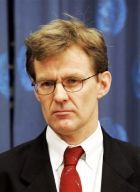Ugandan LRA rebels creating havoc in southern Sudan – UN
Dec 19, 2005 (UNITED NATIONS) — Uganda’s brutal rebels are interfering with U.N. humanitarian supplies in southern Sudan and are still getting weapons from somewhere, the U.N. emergency relief coordinator said on Monday.
 Undersecretary-General Jan Egeland told the U.N. Security Council that the lives of millions of Africans were at stake in conflicts in Sudan and Uganda as well as food shortages in Zimbabwe and other southern African nations.
Undersecretary-General Jan Egeland told the U.N. Security Council that the lives of millions of Africans were at stake in conflicts in Sudan and Uganda as well as food shortages in Zimbabwe and other southern African nations.
The Lord’s Resistance Army in northern Uganda, notorious for kidnapping, raping and maiming tens of thousands of children, has forced 1.7 million Ugandans into camps, which often are hard to reach because of their continuing attacks.
Originally armed by Sudan, Egeland said the group was still creating havoc in southern Sudan, attacking humanitarian workers trying to help refugees return to their homes after three decades of civil war in the south.
“The LRA continues to maintain bases and moves relatively freely throughout the region,” Egeland told the council.
“They are getting arms from somewhere. They are getting support from somewhere, internally and externally,” he told reporters after the meeting.
Human Rights Watch said earlier this year it received reports of weapons delivery to the LRA from the Sudanese government. But the Khartoum government, which once supported the LRA but now allows Uganda to chase the rebels across the border, denies it.
One former rebel commander told the rights group that LRA fighters have avoided capture in 2005 by slipping through Sudanese government lines near the town of Juba.
Uganda, however, has protested against putting the crisis on the Security Council’s agenda, possibly because abuses by its own army towards the displaced people, may be raised.
But Egeland told the council it was time for the council to condemn the LRA attacks and establish a panel of experts to find out how such a small group was “able to wreak such havoc in the region” and how it obtained funding and weapons.
DARFUR
On Sudan’s lawless Darfur region in the west, Egeland warned that the world’s largest humanitarian operation of 13,000 foreign and local relief workers was “under constant threat” because of the ongoing violence.
He called for an expanded security presence on the ground, now being provided by African Union monitors, regardless of the outcome of talks between the government and rebels in Abuja, Nigeria. The United Nations and the African Union are currently on an assessment mission in Darfur, which U.N. officials said might lead to a U.N. peacekeeping force in the west.
“It cannot be right that we have twice as many humanitarian workers in Darfur as international security personnel,” Egeland said.
“The killings have not stopped,” he said. “The rapes are continuing as are the burning, looting and forced displacement” he reported 20 months ago.
The conflict began in February 2003 when rebel groups took up arms against the Khartoum government, arguing that Arab tribes received preferences in resources and wealth.
The United Nations estimates that tens of thousands of people have died and some 2 million have been herded into camps inside Sudan or neighboring Chad.
Egeland said the camps were under frequent attack by militia, the code name given to Arab horsemen, who had been armed by the government to put down the rebellion, which he said had now spilled into Chad.
(Reuters)
